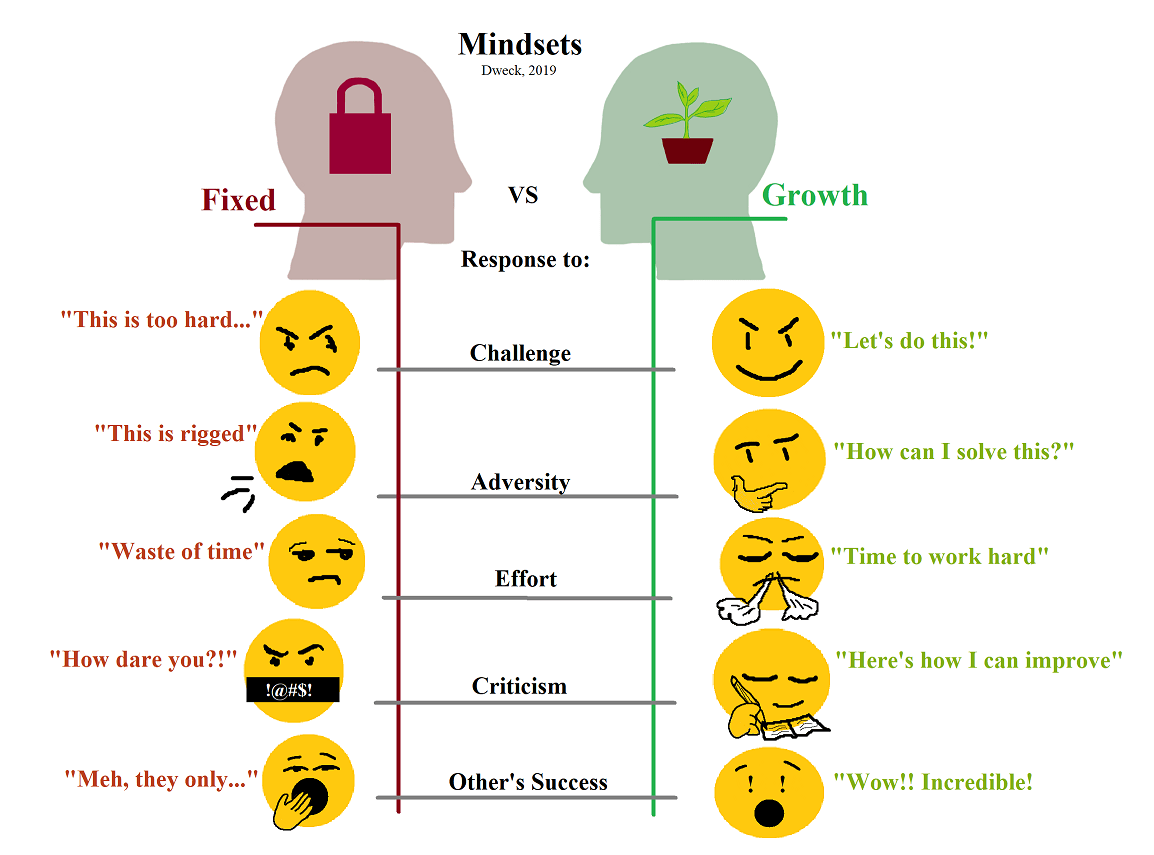Growth Mindset Examples for Work and Life
A growth mindset will help you face challenges and work more productively towards your goals
We all go through times when nothing goes right and we just can't seem to catch a break. This could be due to many things -- unfortunate timing, a lack of support and direction, or simply too many challenges at once. But if you have these phases more often than usual, you may have to do some introspection.
Often failures and setbacks can occur as a result of the way we approach things. Humans have a tendency to get stuck in a particular routine that comes with the environment-- be it school, the workplace, or even relationships. We thus develop a fixed mindset of how and when to do things, without the ability to think outside the box. This feeling of being stuck in a growth mindset can zap your enthusiasm, creativity, and purpose to keep moving towards success in life.
How do you get out of this zone? The answer is to try and adopt a mindset geared towards growth, where you're constantly pushing yourself to keep your mind challenged and engaged. Read on to understand growth mindsets better and get some ideas to execute them at work and life.

What is a Growth Mindset
According to experts, a growth mindset simply means acknowledging that your talents, skills, knowledge, and thinking are constantly in development. The learning process is lifelong and it doesn't just stop once you finish your education or training. As you move forward in life, you continue to pick up new skills, embrace challenges, accept failures, and keep working on self improvement.
People with a growth mindset are less stressed and achieve success more, because they are able to see the big picture, overcome challenges, get back up after falling down, take constructive criticism with a positive attitude and are not afraid of the unknown.
Growth Mindsets vs. Fixed Mindsets
People with fixed mindsets tend to always tread the path of least resistance, where the work to be done is familiar and something that falls within their range of skills and knowledge. But having a growth mindset means you seek new opportunities and are not afraid to keep pushing on, having a fixed idea of your own abilities will typically see you giving up more often, shying away from new things, and wallowing in self doubt and disappointment.
So, how do you make sure your mindset is geared more towards growth? It can be as simple as remembering some practical guides to approach your everyday life. Here are just a few examples of how to inculcate a growth mindset.

Growth Mindset Examples To Consider
Get out of your comfort zone
Say you've got two new projects at school or at work. One of them is basically a repeat of processes you've done before, so you have no problem planning and executing it, and you know you can do it well. The other one, however, is something you've never even seen before, let alone tried. It's going to involve a lot of work, hours and full commitment. Which one will you choose?
Your fixed mindset is likely to urge you to choose the familiar project, which falls right in your comfort zone. But if you want a growth mindset in life, you have to push yourself to go into unfamiliar territories; the second project may contain more risks, but you'll surely gain more by opting for it.
Novelty keeps things interesting
Imagine you get your dream job and have been doing it for about three years. The role does come with some dynamic work, but you've more or less learnt how to deal with anything that comes your way. At this point, you should be feeling satisfied and content. But, if you're feeling bored and unmotivated every day, your mindset needs to change.
Why don't you try switching teams or responsibilities for a few days? Approach a colleague whose job you know little about, and ask them to make you their apprentice for a week. Or, involve yourself in a team project you've never been assigned to before. Bringing in such small, temporary changes to your everyday work will keep your mind sharp and help you stay engaged.

One small step is enough
When you're trying something new, like learning how to play an instrument or work with a new technology, you're bound to think of the big picture and all the future possibilities. This can actually make the work you have to put in much more extensive and complicated, and so you might begin to dread it and procrastinate. But maybe it doesn't have to be so big and complex.
If you develop a growth mindset before you start the work, you may end up breaking the big goal into tiny, measurable steps. Then, it's just about completing one small step every day, and before you know it, you've finished what you've set out to do.
Want to learn how to break your big goals into teeny, tiny pieces? Try our SMART goal generator here!
Don't fail yourself beforehand
If you've taken a leap of faith and decided to do something you've never done before at work, you're likely to feel some pressure to get it right. In such situations, people with fixed mindsets try to make themselves feel better by having an out--saying they'll just try it, but if it's too hard or they can't get it right, they'll quit. But with this attitude, they've subconsciously decided on failure before making a start.
So, when you actually want to do something new with a growth mindset, you've got to learn to be optimistic. Focus on the thrill of learning something, of having the privilege to expand your knowledge and skills. Quitting, sooner or later, should be the last thing on your mind.
Accept your knowledge gaps, but try to close them
We've all had that one boss who just doesn't seem to get how things work. They constantly struggle with new technologies, shortcuts or even new ideas that come with modern life. What's worse, they refuse to acknowledge the gaps in their understanding, and instead insist that their way is the only way. If you know a leader like this now, you're looking at a prime example of a fixed mindset. Denying your own limits and refusing to see beyond them is how you keep growth at bay.
So, be honest with yourself. Admit your blind spots, to yourself and others, and invite opportunities to gain more clarity so you don't limit your own understanding of things.
You can never know it all
The world is constantly evolving, and so is everything in it. You may have a PhD in biology, but may still not know every single organism on earth. And, there's no way you will, as millions are being discovered and will continue to be found long after you're gone. So, there's no way to completely know anything to death.
When you acknowledge this, you start to push the limits of everything around you. You welcome new advancements and keep learning them, even beyond your professional requirements.

Capability does not guarantee success
Now, you may know how a boat works, but does that mean you can sail across the Atlantic? Or, you may have the talent and enthusiasm for basketball, but are you ready for a one-on-one with Michael Jordan? With a fixed mindset belief, you may actually answer yes to both questions. This is because you mix theory with practice--simply knowing how something is done doesn't guarantee that you'll be able to do it successfully. So, just like you shouldn't admit failure before starting on something new, don't assume success either -- while confidence is a fine trait, overconfidence isn't!
Practice makes perfect
Think of the last time you started a new hobby, like cooking. Your first attempt may not have been great-- maybe you didn't season the dish right or ended up burning it! But because you wanted to master it, you practised again and again till you got it just right. Now, it's what everyone wants at holiday parties.
This is what achieving success with a growth mindset feels like. You started on a new task, failed but kept going till you finally got it right.
Others' success is not your failure
If you're into any sport, you'll know that almost always there can only be one winner. But that person's success is not necessarily your failure--you both did your best, and their best happened to inch out yours. That does not mean you failed, rather, you simply gained another milestone to cross as you move forward.
Feedback is not always criticism
In university, there's always one big class project that becomes a passion. You spend time, energy and everything else you can to make it as perfect as possible, to get that A and graduate with honors. But, during a dress rehearsal for the final presentation, a classmate or your teacher points out one section that could be better. How do you take it?
For many people, the first instinct is to reject the comment, retaliate or obsess over it as a failing point. But if you develop a growth mindset, you'll see that it is an opportunity for self improvement--if you can actually make something better and get not good but amazing results, why not take it in and work on it?
Roll with the punches
Having a fixed mindset means being resistant to uncertainty. You may be doing everything right---sticking to your routine, focusing on the work and ticking off all the boxes, but things go wrong anyways. This may discourage you and make you want to quit. But, you know that your growth mindset believes there's always a way out. If you keep going, perhaps with new strategies, you may see all the wrong things turning right. So, accept whatever new challenges are coming and just focus on finding your way through them.

Final Thoughts
Living with a growth mindset allows you to get out of your comfort zone, accept new challenges, get back on your feet after failure, and improve yourself. Learn how to implement it every day and gain the ability to inspire others with your own growth mindset.